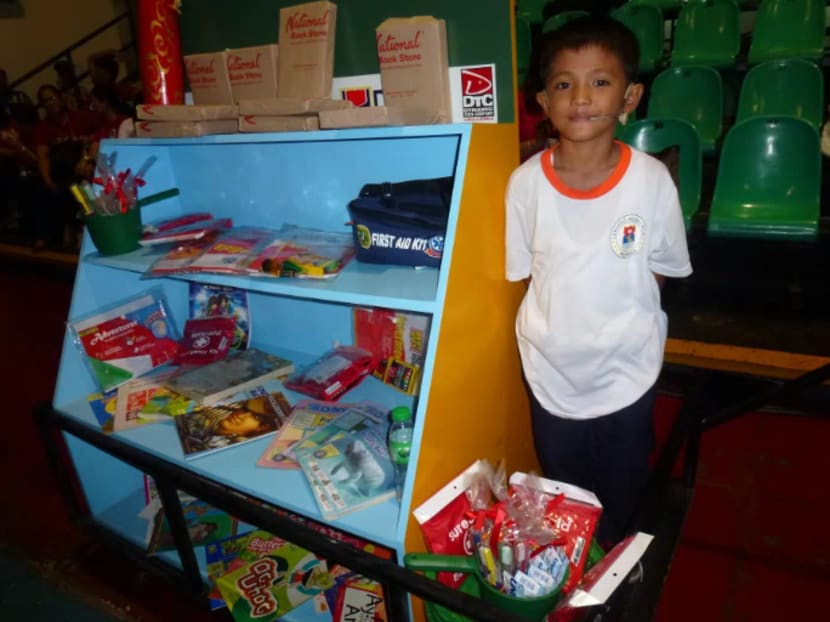Pushcarts in the Philippines bring classrooms to street children
MANILA — Pushcarts rolling on the streets of Cavite, a province immediately south of the Philippine capital Manila, began serving as mobile classrooms for street children in 2007, on the initiative of a nongovernmental organisation called Dynamic Teen Company.

Filipino student Baby Boy Abante, 9, stands on a pushcart that serves as a mobile classroom during a ceremony for 'completers' of the pushcart classroom programme in the Manila suburb Pasig City. Photo: KYODO NEWS
MANILA — Pushcarts rolling on the streets of Cavite, a province immediately south of the Philippine capital Manila, began serving as mobile classrooms for street children in 2007, on the initiative of a nongovernmental organisation called Dynamic Teen Company.
Five years later, the Philippine Department of Education teamed up with the firm for a larger-scale implementation of the pushcart classroom model that earned its founder, Efren Penaflorida Jr, the CNN Hero of the Year award in 2009.
Last month, four years since the forging of their partnership, the Education Department recognised 1,267 children from various parts of Manila who completed the programme, of whom more than half are now enrolled in regular classrooms.
“I appreciate (the programme) because children learn something. It’s fun,” said nine-year-old Baby Boy Abante, one of the children who finished the programme.
Abante was previously not attending school because he had to stay home while his mother went to work. He recently enrolled in a public elementary school in Manila after he was assessed, based on his pushcart school participation, to be fit for the Grade 4 level.
Public school teacher Elena Lopez, who handles another group of pushcart school students from another city, said that a lack of official documents like a birth certificate and mere lack of interest among parents to enrol their children are some reasons why there are thousands of children out of school in Manila.
“The objective is really to look for children aged five to 14 who are not in school, either because they didn’t enrol from the start or because they’ve dropped out. So, we use the pushcart classroom approach to bridge them to bring the children back to school,” said Education Undersecretary Mario Deriquito of the programme.
“Our purpose for the pushcart classroom is to encourage children to love studying and bring them back to schools. Instead of lingering in the streets, where bad influences proliferate, we want them back in school to finish their studies,” added Mr Penaflorida.
Mr Deriquito and Mr Penaflorida both attended last month’s culmination programme held in the Manila suburb of Pasig City. The main guests included newly elected Vice-President Leni Robredo, outgoing Education Secretary Armin Luistro and outgoing Social Welfare Secretary Corazon Soliman.
Manned by licensed teachers and trained volunteers, the mobile classrooms are equipped with books, charts, and other educational materials, as well as hygiene and first-aid kits, courtesy of different organisations and companies that also support the programme. It provides free paper, notebooks, and pens to participating children, as well as snacks or meals.
They roll out at least once a week in the communities and hold sessions lasting a few hours. Ms Lopez said that in her case, her pushcart classroom is normally stationed in the covered court of the village where she is assigned so that village officials can also lend a hand.
Their “students” include street children and kids in residential slums.
“In the pushcart classroom, we make it very interesting (for the children). There are games and storytelling so that children are then encouraged to go back to school,” said Mr Deriquito.
The 1,267 students recognised in last month’s ceremony are among 1,631 children who attended learning sessions provided by the 59 pushcart schools across the entire Metro Manila starting 2015. Those who eventually enrolled in regular schools number 743, while the rest are continuing to attend their respective mobile classrooms until they become fit to enter a formal learning environment.
There is no immediately available data on the total beneficiaries from 2012, when the education department and Mr Penaflorida’s organisation started working together, until 2014. Mr Deriquito disclosed, however, that in their first year, they had set up 11 pushcart classrooms in Manila alone, estimated to have benefited some 400 children.
“Recently, Unesco recognised our program as one of the good practices for education-for-all in the whole Asia-Pacific. And by next month, the programme will be replicated with Unesco and we’re targeting 16,000 out-of-school youth and children in the Philippines,” said Mr Penaflorida, referring to the United Nations agency for education, science and culture.
With the goal of putting 110 pushcart classrooms all over Manila, the education department is now taking steps to institutionalise the programme and allocate funds for it.
“We will continue to look for street children, through the help of the Department of Social Welfare and local governments. So, the pushcart classroom will just continue to roll out,” said Mr Deriquito of the programme’s prospects for the future.
Commenting on former out-of-school children who have made the transition to regular school attendees, Mr Penaflorida said his organisation hopes they do not drop out and complete their studies through college, “so their lives will be productive”.
“Education is a powerful tool to fight poverty and ignorance,” he said.
With his interest in going to school invigorated by his pushcart classroom experience, Abante said he looks forward to learning more about science, his favourite subject, as he now enters a formal education environment. Having learned good study habits during his participation in the pushcart classroom sessions, Abante dreams of eventually finishing school.
“I just want to work in an office when I grow up,” he said. kyodo news









